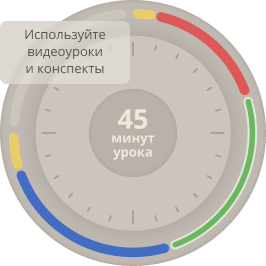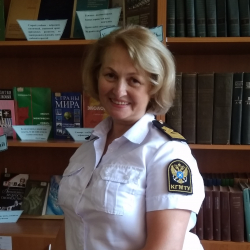

СДЕЛАЙТЕ СВОИ УРОКИ ЕЩЁ ЭФФЕКТИВНЕЕ, А ЖИЗНЬ СВОБОДНЕЕ
Благодаря готовым учебным материалам для работы в классе и дистанционно
Скидки до 50 % на комплекты
только до 01.08.2025
Готовые ключевые этапы урока всегда будут у вас под рукой
Организационный момент
Проверка знаний
Объяснение материала
Закрепление изученного
Итоги урока

Доклад "THE DEVELOPMENT OF COGNITIVE ACTIVITY IN TEACHING FOREIGN LANGUAGES "
Natalya Suhareva
Shipbuilding Mechanical Technical School of the Federal State Budgetal Educational Establishment of Higher Education “Kerch State Maritime Technological University”
THE DEVELOPMENT OF COGNITIVE ACTIVITY IN TEACHING FOREIGN LANGUAGES
In the modern world, English is the most widely used to connect people in different fields. It is the international language, the language of the "air and sea", i.e. it is the working language of Air and Maritime transport operators. Therefore, in the Kerch Shipbuilding Mechanical Technical School of the Federal State Budgetary Educational Establishment of Higher Education "Kerch State Maritime Technological University" this discipline is given special attention. In our work we are guided both by new demands for mastering educational programmes in the Russian Federation and the requirements of the IMO, which has developed model courses in various fields of training of seafarers, including the model course of "Maritime English".
To avoid losing his/ her competitiveness in the rapidly changing world the future specialists must continually improve his/ her competence, i.e. he/ she must continue to get knowledge independently. Thus, the need is to develop students' versatile skills of learning activities, so that they can use them in the future.
This issue has received a new impact with the development of competency-based approach to education, according to which competency based training and assessment is necessary. In simple terms, “competency based training and assessment” means that a person is trained and assessed to meet specified standards that reflect the skills, knowledge and behaviours required to safely and effectively do specified work. In the seafaring context, the work could be keeping a bridge or engine-room watch, or performing a task such as making a mooring line fast or starting the emergency fire pump. [1]
A.V. Hutorskoy, the founder of the competency-based approach in education, considers the competence in the field of independent cognitive activity of a student, including knowledge and the ability to define a goal for future activities, planning, analysis, reflection, self-evaluation of his/ her educational-cognitive activity to be an educational-cognitive competence (one of the seven groups of competencies). [2] A trainee possesses creative skills of productive activities: extraction of knowledge directly from the reality, heuristic methods of solution. That is, an educational-cognitive competence is the ability to acquire knowledge, skills and abilities (competencies) for the purpose of solving educational task independently.
One of the main goals of foreign language teaching is the formation of foreign language communicative competence in a variety of its components. The progress and fundamental changes in the methods of teaching languages are clearly correlated with innovations in the field of psychology of an individual and group. Noticeable changes in people's consciousness and the development of new thinking are now felt in the modern society. A need for self-actualization and self-realization proclaimed by A. Maslow appears. [3] The psychological factor in teaching foreign languages is coming to leading positions. Authenticity of communication, suspended claims, mutual benefit and respect for freedom of others are a set of unwritten rules of building constructive relationships within the system "teacher-student".
At the same time, the principle of variability, proclaimed in the educational system of the Russian Federation gives the possibility for secondary special educational establishments to choose any model of the pedagogical process, including models designed by individual authors. In these circumstances, the teacher of a foreign language has certain freedom of creativity, freedom to choose innovative models and technologies of training, without which the modern educational process is unthinkable.
Innovative phenomena producing specific activity of teacher in modern conditions, determine the transition from a knowledge paradigm of the pedagogical process to the individual, from “informing” teaching methods to interactive ones.
Today there are a lot of methods of English language teaching, and each teacher can choose the most suitable in the given group and school.
In connection with above mentioned the method of using mind maps can be advised. This is representation on paper of an effective way to think, to remember, to revise, to solve creative tasks, the ability to visualize the internal processes of information processing, to change them etc. They can be used by teachers for explaining a new topic, organizing and structuring information, arranging and carrying out assessment, summarizing knowledge. As for a trainee, with the help of mind maps he/ she will be able to organize his/ her knowledge, to use it as a speech outline. Every person approaches to the creation of mind maps in his/ her own way. But in the heart of the map there always must be the Central Idea, branching into sub-ideas and levels 2, 3 and others. You can apply drawings, colored pens, different print styles to create mind maps. [4]
One of the most effective means of development of thinking of future graduates seems to be an imitation modeling. This approach to training provides imitation of elements of professional activity, with its typical and significant features. Its application at the lessons allows instructors and trainees to generate the skills of communication, develops a self-control habit, promotes real preparation for upcoming activities and life in society in general. At the same time it helps to make foreign language lessons by more alive, interesting, meaningful, gives a greater possibility to express opinions, feelings, thoughts and evaluations.
It is necessary to mention the method of projects. Although the method of projects originated in the early 20th century, it belongs to the pedagogical technologies of the 21st century, as they form the ability of a trainee to adapt in the changing world and simultaneously solve the problem of the development of versatile skills of his/ her learning activities. [5] It includes 5 stages:
- Preparation
- Analysis
- Practice
- Presentation
- Assessment
Students are encouraged to prepare a monologue or a dialogue individually and in pairs, presentations and small reports at lessons and scientific and practical conferences which are regularly held at our educational establishment.
Using the Internet in teaching foreign languages gains more and more worshippers. The introduction of information and communication technologies in the training process began quite recently. However, the pace of their expansion is incredibly rapid. The use of Internet technologies at foreign language lessons is an effective factor for the development of motivation of the learners. In most cases students like to use computers in their work. Since such classes are held in an informal atmosphere, students are given the freedom of actions, and some of them can show off their knowledge in the field of IT. Prospects of use of the Internet technologies are rather wide nowadays. It can be:
- Correspondence with English-speaking countries residents via e-mail;
- Participating in international Internet conferences, seminars and other network projects of this kind;
- Creation and placement of sites and presentations across the network.
Sites and presentations can be created jointly by a teacher and his/ her students. In addition, you can exchange presentations with teachers from different countries.
It is desirable to pay special attention to WebQuests. It's a problem task with Role-Playing Game elements. To perform the task Internet resources of one specially created site are used. The creators of a web-quest B. Dodge and T. March highlighted certain methodological requirements that must be followed when developing a hypermedia web quest which is intended for independent work of a student: Thus, in the structure of the web quest there are the following main parts:
- Introduction
- Task – the main goal to be achieved
- Process – the description of the working process
- Evaluation Table
- Conclusion
- Credits - Author’s rights recognition
- Teacher Page
“What is a real WebQuests? In a real WebQuest, newly acquired information undergoes an important transformation within learners themselves. Getting information—the “learning input”—is the easy part. The WebQuest gets trickier and more interesting in the next part, in which transformative learning takes place and teachers and students can realize—or fail to realize—the potential of a WebQuest. How can WebQuests prompt the intangible “aha” experiences that lie at the heart of authentic learning? The use of powerful learning strategies differentiates real WebQuests from mere Web-based activities.
A real WebQuest is a scaffolded learning structure that uses links to essential resources on the World Wide Web and an authentic task to motivate students’ investigation of an open-ended question, development of individual expertise, and participation in a group process that transforms newly acquired information into a more sophisticated understanding. The best WebQuests inspire students to see richer thematic relationships, to contribute to the real world of learning, and to reflect on their own metacognitive processes.” [6] The themes for WebQuests may be very different. For example:
- Terrorist or Freedom fighter?
- Look Who’s footing a Bill
- The Big Wide World WebQuest
To help the teacher in the creation of WebQuest sites there are models developed and presented on the official website dedicated to web quests. [7]
The task of developing, improving and optimizing of teaching foreign languages methods has always been one of the topical problems of the Russian education. The researches in this field has shown that teaching a foreign language today is impossible without the innovation component. According to modern requirements to the purposes of foreign language teaching the status of both a student and a teacher is changing and transforming from the scheme “teacher – student” to the technology of student-centered teaching, which is conducted in tight cooperation between them.
References
- Model course 3.17 “Leadership and Teamwork”/ IMO electronic edition, 2014.
- Мaслоу Абрaхaм Гaрольд. Дaльние пределы человеческой психики / Перев. с aнгл. А. М. Тaтлбaевой. Нaучн. ред., вступ. стaтья и коммент. Н. Н. Акулиной. - СПб.: Еврaзия,1999.-432с.
- Шевцова М. В. «Использование интеллект-карт на уроках английского языка»/ М. В. Шевцова // Английский язык. Всероссийский научно-методический журнал. – 2015. – № 8 [44]
- Ерохина Е. А., Сапа А. В. «Метапредметный проект» / Е. А. Ерохина, А. В. Сапа // Английский язык. Всероссийский научно-методический журнал. – 2015. - № 7 [43]











